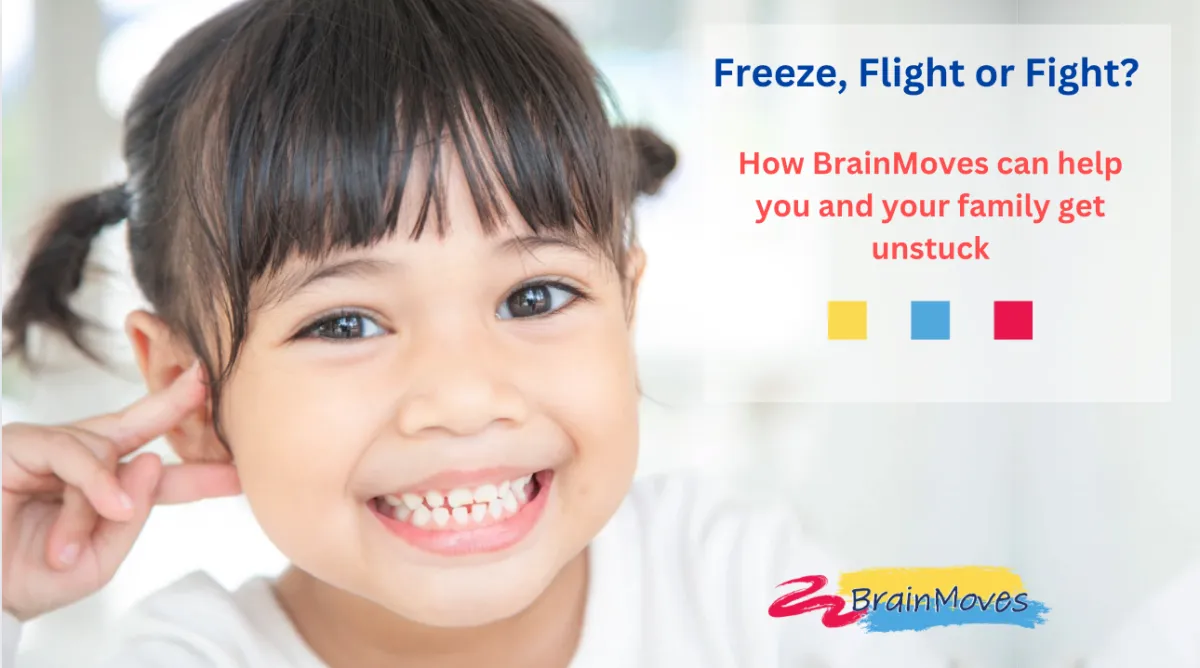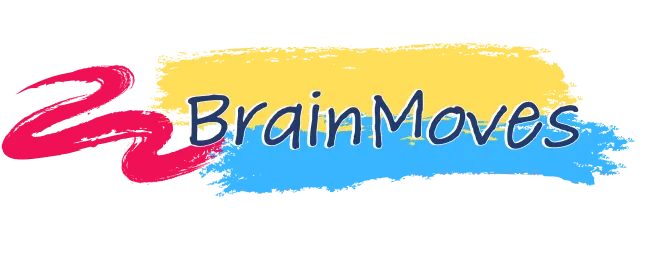
Freeze, Flight or Fight? How BrainMoves can help you and your family get unstuck
We often hear about the fight or flight response in popular psychology, and we're increasingly aware of how long-term stress impacts our physical and mental health. Yet, identifying chronic stressors isn't always straightforward. While unmet basic needs like food and safety are obvious stressors, subtler threats also exist. For example, living in a hurricane-prone area requires constant vigilance, a stress recognized by the entire

community. Equally troubling to families are less visible threats such as economic instability, fears of climate change, and political upheaval. Although we may think we're coping, we often find ourselves shutting down as a defense mechanism. The COVID pandemic introduced additional stressors: inflation, concerns about foreign conflicts, and the rising costs of essentials like insurance and groceries, all amidst a volatile job market. In such times, stress is present for children and adults alike, affecting entire families.
How do you know if you are in freeze, flight or fight mode?
You might experience difficulty making decisions, difficulty prioritizing because everything feels equally necessary, or intense apathy because nothing feels more important than anything else. You could be suffering from procrastination as you wait for a more perfect solution or a more perfect moment. Particularly if you’re thinking of investing or making a big decision like moving house or changing schools, you might have feelings of apathy or even depression where nothing seems to shake you out of a fog.

Others suffer from short-term memory issues, which can often appear like ADHD or even early symptoms of dementia. It’s actually your mind frozen in the freeze reflex. Some may experience physical, somatic signs of distress like headaches, migraines, digestive issues, and trouble sleeping.
In children—where behavior is often their primary method of communication—we expect to see mood swings and lashing out when they’re overtired or overstressed. But adults can very easily have mood swings, meltdowns, and floating, generalized anxiety as well.
BrainMoves movements are a helpful, and easy way for anyone to manage the anxieties associated with being in fight-or-flight or freeze mode.
If this topic interests you, you might want to check out some of our earlier posts. There are several movements that can help “turn off” the freeze reflex. These include the Bear Cub, the Koala Cub, the Duckling, the Octopus, and the Toucan.

The Koala Cub (helps to relax the freeze, fight, or flight reflex in the ears. When this reflex is on, the muscles on and in the ears can contract, which, in turn, can affect and/or block the auditory processing centers of the brain.)
The Octopus (Makes sure that both sides of the brain are equally using the general, visual, and auditory processing centers. It makes sure that each side of the brain is doing its own job; For example, in hearing, Right = concepts and left = words) Good for processing instructions in emergencies or times of stress
The Bear Cub (Helps improve organization, memory and focus. Supports recovering from Trauma or emotional meltdown. Enhances problem-solving)
The Duckling (helps with concentrating, speech, coordination, gross motor skills, regulating sleep, and supports confidence and balance)
The Toucan (helps with hyperactivity, promotes focus, staying calm, and thinking clearly, brings awareness to the front and backside of the head)
Each of these movements targets a particular area where the brain and body tend to freeze or lock when the freeze reflex is initiated. When the freeze reflex is activated, the primal portion of our sympathetic nervous system launches us into a program where we can’t run from our problems or fight them. Then, like an animal cornered, we freeze and hope that the thing chasing us loses interest.
Some stresses don't go away, but if we are more relaxed, we are better able to process and problem solve, and MOVE FORWARD.
Taxes and tariffs will not go away, and you have little control over the price of eggs. With daily BrainMoves, you can approach the world with a calmer perspective that helps you respond in a peaceful and productive way that supports you and your family - even when the brain and body tend to freeze under stressors.

The challenge is that, while it can motivate many people to do something—run, fight, solve the issue—for many, it simply puts them into a freeze mode in which they can’t make decisions or move forward. When we are in freeze, we can’t move ahead literally, mentally, or emotionally.
As children in freeze mode, you cannot learn, hear, or interact.
As an adult in freeze mode, you cannot take care of your responsibilities for yourself, your family, your environment, or your career, because every decision will feel heavy and complicated.
Your body is literally trying to hold you still until things improve. By using each of the BrainMoves to switch off portions of the body affected by the freeze reflex, you are somatically and systematically helping your body enter a state where your memory improves, you are better able to absorb information, and you can make decisions more easily. Picture a morning where the family sits around the breakfast table, sharing a calm meal and planning their day with smiles and laughter, the typical morning rush now replaced by peace and organization.
Think of how much easier your conversations would be if you could approach even difficult ones with a clear mind and readily absorb the information the other person is telling you, so you could understand their position.
Imagine how much easier transitions between the breakfast table and the school bus would be if your child didn’t run around looking for five different things before you were able to send them out the door with their backpack.
Imagine how much easier it would be if your preschooler could sit still and listen to the lessons the teacher is teaching the class.
BrainMoves can help with all of these things by allowing you and your child to be more relaxed, more patient, and more open to new input and experience. Especially where we are socially, economically, and politically, we could all use a little more peace and tranquility.

By making BrainMoves part of your daily routine, you're not only supporting your child's growth but also fostering a positive, nurturing environment for their overall development. You will notice the benefits of the BrainMoves movements as you do them with your child, helping you make decisions, problem solve and move forward on a daily basis.
It is easy to learn and use BrainMoves Movements. In just 5 minutes a day you will learn a lifetime of movements that will help preschoolers at home and in the classroom.
Buy now and get LIFETIME access to the course. TAKE THE FIRST STEP TOWARDS MOVING YOURSELF OUT OF FREEZE MODE if you are feeling stuck or have been putting off buying the course.Take advantage of our summer sale and get the self-paced online BrainMoves Course for $297.00


